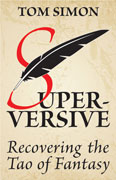I’ve heard Brian Aldiss talk about the same phenomenon. For him, a novel often requires two ideas. He describes them as a combination of ‘the familar’ and ‘the exotic’. He begins with ‘the familiar’ – usually something germane to his personal life, either thematically or experientially – but he can’t write about it until ‘the familiar’ is impacted by ‘the exotic’. In his case, ‘the exotic’ is usually a science fictional setting in which ‘the familiar’ can play itself out: ‘the exotic’ provides him with a stage on which he can dramatize ‘the familiar’. Rather like a binary poison – or a magic potion – two inert elements combine to produce something of frightening potency.
The same dynamic works in reverse for me. I start with ‘the exotic’… but that idea declines to turn into a story until it is catalysed by ‘the familiar’.
For example: The Chronicles of Thomas Covenant is squarely – and solely – founded on two ideas: unbelief and leprosy. The notion of writing a fantasy about an ‘unbeliever’, a man who rejects the whole concept of fantasy, first came to me near the end of 1969. But the germ was dormant: no matter how I laboured over it, I couldn’t make it grow. Until I realized, in May of 1972, that my ‘unbeliever’ should be a leper. As soon as those two ideas came together, my brain took fire.
—Stephen R. Donaldson, The Real Story
Three times in the last sixty-odd years, a work of fantasy has come along that redrew the whole map of the field; that banished the limits of the publishable, as then understood, as suddenly and thoroughly as Columbus banished the ‘ne plus ultra’ from the Pillars of Hercules. Lately I have been thinking hard about these works, seeing what they had in common with one another, and what set them apart from the other fantasies of their times, to see whether I could account for the magnitude of their success.
All three of these breakthrough fantasies can be described in terms of Aldiss’s ‘exotic’ and ‘familiar’. Each, considered thematically, is a collision between two great, or at any rate large, ideas. And when I began to look at them in this light, I found a curious thing: which idea was ‘the exotic’ and which was ‘the familiar’ was not as obvious as it seemed. Indeed, the works themselves tended to familiarize the exotic and exoticize the familiar, so that those whose habits of mind were formed afterwards would never quite see the ideas as their first audiences saw them.
Let me see if I can explain what I mean.









Recent Comments